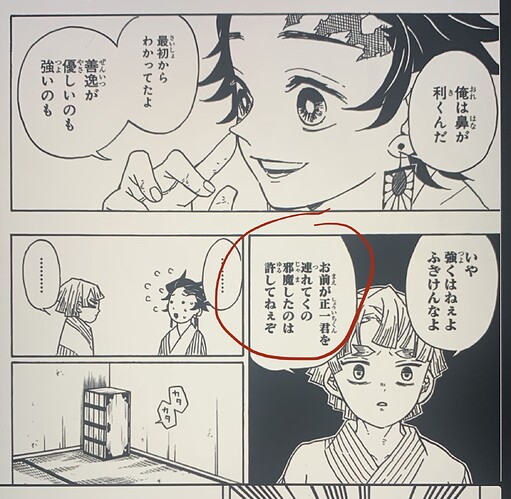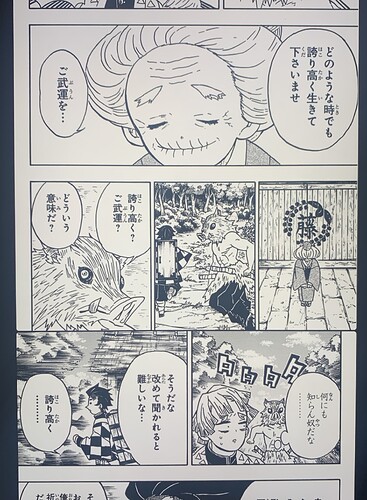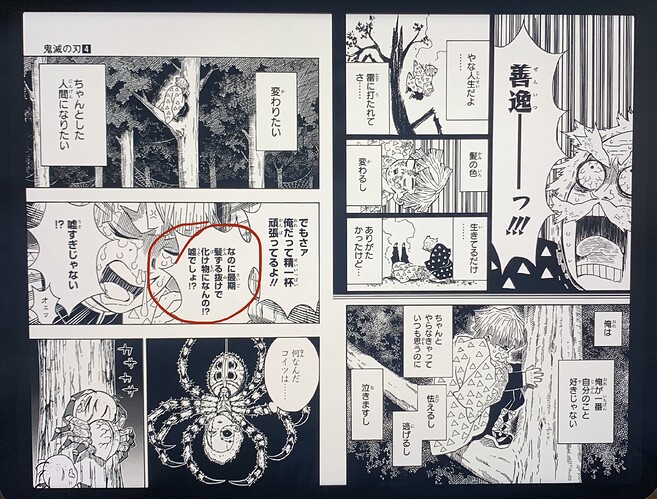Actually “cadere di testa” (and the Spanish “caer de cabeza”) are so natural for me I never thought about them; it is the Japanese sentence you posted that made me fully realize it.
It seems strange to have an illumination about a thing in your language trough another, but it happened me several times. The other language introduce a different angle of view, it can be very small, but sometimes that different angle allows you to see something that remained hidden to your eyes in a familiar object.
Indeed it’s the same for me, sometimes I encounter peculiar aspects of the Japanese language that make me consider about mine in some (different) ways
4.27.40.4
Doubts on the bubble in the red circle. Why is it 連れてく? Is the る just completely dropped or is something else happening?
What is the の after 邪魔した? Is it a subject marker? I’m not sure how to translate the entire sentence, I would say “I won’t forgive you for having stopped me from carrying Shoichi-kun”.
This is a contraction of 連れていく “to take somebody (away) with you”.
This is a nominalizer – it turns the preceding verb-phrase into a noun, which is what you need for Xは許していない “I haven’t forgiven you for X”.
But 伊之助 doesn’t. He is illiterate and uncivilized (ぜんいつ when hearing the question thinks 何にも知らない奴だ, “it’s a guy that knows nothing at all”), he asked the meaning of those words.
炭治郎 tells him:
“When asked a new, it is difficult [to properly answer]” (eg, at second thought, those are not easy words)
誇り高く…
Note the dots. It is the start of a new sentence, explaining the word:
誇り高くというのは(言葉の意味)だ
![]()
![]() good old Inosuke
good old Inosuke
Got it!
4.33.154.5
“ちゃんとやらなきゃっていつも思うのに”
I suppose I can translate this as “I always thought of having to do it right” but I’m not sure about the やらなきゃ verb. Is it なきゃ(ならない)? Can this grammar point be used with the second part left implicit in the middle of the sentence?
Yes, it’s なきゃ(ならない), and it works here because the って is doing a direct quote. (I would translate it as “I always think ‘I have to do it right’ [but]”.)
Oh right, the quote!
4.33.155.2
“なのに最期髪ずる抜けで化け物になんの!?嘘でしょ!?”
What is 髪ずる抜けで? what is ずる? What is 抜け? Is で the connective form of copula? Or particle?
So ずる means to slip off or to pull. From what I can gather 抜けで means to fall out. I don’t remember the context for this otherwise I would help more.
No worries, thank you for the help. About ずる, I still find it and that piece of sentence quite weird, here’s a bit more context, could you try providing a literal translation to help me understand?
Finished Vol. 4 last night, starting with Vol. 5 today after work! Took me only a couple days to finish it, but yesterday I read for an undecent amount of time😁
Google gives me this, does it help?
Yes it helped! Now I know what that means but I’m still not sure what’s ずる抜けで, how does this mean that hairs fall all at once?
5.36.31.5
お、丁度いいくらいの鬼がいるじゃねぇか
Context: Tanjiro is conversing with two demons he just met, and he’s about to fight them. One of the two is supposedly incredibly strong. Suddenly, another demon slayer arrives, and that is his first line.
I’m not sure if to interpret it as “Oh, exactly the demon(s) I was looking for” or “Oh, there’s just the right amount (2) of demons (maybe because they are two demon slayers and the demons are 2 as well?)”
Edit: his next line is “こんなガキの鬼なら俺でも殺れるぜ” (he’s about to be brutally slaughtered)
5.36.32.4
出世すりゃあ上から支給される金も多くなるからな
I’m not sure what 上から支給される means. “Get paid from above”? That doesn’t make much sense to me
Edit: it’s […] 上から支給される金 […] → money paid from above (increase if get promoted).
5.36.43.2
どこまで登っとんじゃ!! […]
What contraction is happening here?
I’m currently reading through Demon Slayer, and many panels are absolute cake, and others come across as complete gibberish to me. I’m only just getting into N4 grammar though.
If I had to guess, I would say maybe 登っておるのでは
Ah, makes sense!
What about the first question on 丁度いいくらい, do you have any guess?



